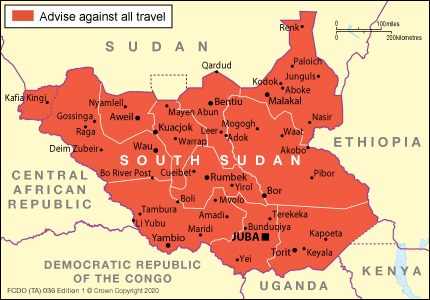South Sudan
Summary

The Foreign, Commonwealth & Development Office (FCDO) advise against all travel to South Sudan.
If you choose to travel to South Sudan against FCDO advice, exercise caution and vigilance at all times and avoid any travel during the hours of darkness. You should make sure you have comprehensive contingency plans that don’t rely on support from the Embassy, including a stock of essential supplies and up-to-date travel documents and visas. If you’re concerned about your safety, you should contact the FCDO on +44 207 008 5000.
COVID-19 entry restrictions for South Sudan
Before you travel, check the ‘Entry requirements’ section for South Sudan’s current entry restrictions and requirements. These may change with little warning. Monitor this advice for the latest updates and stay in contact with your travel provider.
Travelling from and returning to the UK
Check what you must do to travel abroad and return to England, Scotland, Wales or Northern Ireland.
If you plan to pass through another country to return to the UK, check the travel advice for the country you’re transiting.
If you’re planning travel to South Sudan, find out what you need to know about coronavirus there in the Coronavirus section.
During the COVID-19 pandemic, it is more important than ever to get travel insurance and check it provides sufficient cover. See the FCDO’s guidance on foreign travel insurance.
For information about COVID-19 vaccines, see the Coronavirus page.
Consular support is severely limited in South Sudan. The British Embassy in Juba does not have a consular section. If you are in South Sudan and need urgent help from the UK Government, contact the British High Commission in Nairobi.
You should be vigilant of the local security situation, monitor the local media, and stay in a safe location. Advice to travellers remains that you should avoid all protests and large gatherings and follow the instructions of local authorities and security services. Most international organisations in South Sudan employ a security manager to monitor the situation and keep employees safe.
A ceasefire is currently in place, and has largely held since September 2018. However, there are regular reports of intercommunal violence in some areas of the country, as well as sporadic reports of fighting between armed groups. Serious criminality in Juba, and other urban areas, particularly during the hours of darkness, is also a regular concern. A deterioration in the security situation remains possible, and could be prompted by a number of factors including developments in the fragile economy,economy and the ongoing peace process, or a more securitised response to coronavirus (COVID-19).process.
In the event of a serious deterioration in the security situation, similar to those of July 2016 and December 2013, routes into and out of South Sudan may be blocked, blocked. Juba airport may be closed or inaccessible, and flights may be suspended at short notice. Regional developments may also increase the unpredictability of infrastructure and transport, as happened in April 2019 when events in Sudan led to the temporary closure of South Sudan’s airspace.
The main road connecting Juba to Uganda is extremely dangerous, with regular reports of accidents and attacks on vehicles by armed groups. See Safety and Security. The border has now reopened following the lifting of restrictions in place in the region in response to COVID-19. ATo negativeenter COVID-19Uganda testfrom certificateSouth isSudan, requiredyou’ll atneed Uganda’sthe landappropriate bordersvisa, and either (i) proof of fully vaccinated status or (ii) a negative COVID-19 PCR certificate issued no more than 72 hours prior.before departure. Children under 5 years old are exempt from these requirements.
Terrorist attacks in South Sudan can’t be ruled out. See Terrorism